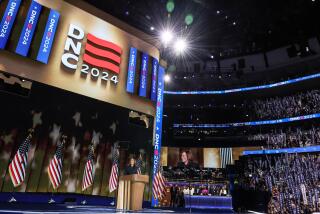Glenn Beck, liberal hero
- Share via
There was something almost poignant about seeing dozens of liberal commentators extend props last week to their cardinal antagonist, Glenn Beck. Despite their religion of hating the guy, many members of the left-leaning punditocracy admitted that Beck was actually reasonable on the matter of suspected Times Square bomber Faisal Shahzad, a naturalized U.S. citizen from Pakistan who, Beck said, should be read his Miranda rights, not stripped of his civil liberties for the sake of national security.
“He’s a citizen of the United States, so I say we uphold the laws and the Constitution on citizens,” Beck said on Fox News shortly after Shahzad’s arrest. “A lot of citizens [are threats to the country].... We don’t shred the Constitution when it’s popular. We do the right thing.”
What was remarkable wasn’t that Beck said this without crying on his desk but that, compared to some conservative lawmakers, he seemed downright middle of the road.
At about the same time, Sen. John McCain told radio host Don Imus that granting Shahzad his Miranda rights would be a “serious mistake … until we find out what it’s all about.” Sen. Joe Lieberman went even further, suggesting there should be a process under which American citizens who become involved with foreign terrorists could be easily stripped of their U.S. citizenship.
The result was that Beck looked uncharacteristically dovish in comparison.
“Credit Glenn Beck of Fox News for breaking with that sort of demagoguery and asserting that the rule of law is basic to our freedom and not just an inconvenient indulgence,” Robert Scheer wrote in an article in the Nation entitled “Glenn Beck Gets It Right.” University of Texas law professor Sandy Levinson was so sour on Lieberman that he wrote on the blog Balkanization: “I’ll take Glenn Beck … over the egregious junior senator from Connecticut.” Even Jon Stewart joined in on the join-hands-with-Beck fun, juxtaposing videos of a paranoid-sounding McCain and a levelheaded-sounding Beck while his audience gasped in shock.
But amusing as it has been, all of this has also somehow managed to be almost poignant rather than actually poignant — or even all that meaningful. That’s because praising Beck seems less about giving credit where it’s due than about seizing the rare opportunity to disprove certain laws of physics — like the one that says Scheer and Beck will never share even a tiny fraction of ideological space. It doesn’t rise above culture war cliches; it proves one of the biggest, that most media conservatives are too unsophisticated to grasp their own incompetence and too many media liberals’ bleeding-heart inclinations extend to grading on a curve.
There is perhaps no better example of this spirit than what happened immediately after Sarah Palin’s Republican Party convention speech in 2008. “She could not have been more winning or engaging,” NBC’s Tom Brokaw said. Wolf Blitzer of CNN declared her to have “hit it out of the park,” and George Stephanopoulos said on ABC’s “Nightline,” “She definitely gets an A.”
Palin’s performance was, of course, a highly subjective matter. There were clearly many Americans then who believed she hit it out of the park, and there are many Americans now who believe Beck “gets it right” every time he opens his mouth. But did Brokaw and company praise Palin because she was genuinely impressive or because she wasn’t nearly as bad as they expected her to be? Were they patting her on the back or on the head?
Probably a little of both, but the commentators’ praise still smacks more of parents at a T-ball game than anything approaching rigorous analysis. Still, you couldn’t help but notice the degree to which they seemed to enjoy the rush of Good Samaritanism.
Back then, as with Beck last week, the mainstream — some might say “elite” — commentariat surprised itself by finding something nice to say about the unlikeliest of subjects. The problem is that then, as now, the subjects didn’t exactly deserve it. Beck’s words were deemed commendable not because they were brave or revelatory but mostly because they were a departure from a norm; they represented, to many liberals, a moment of uncustomary unterribleness.
It was, at best, a B-plus statement. But in a world of grade inflation, he was the honor student of the week.
More to Read
Get the L.A. Times Politics newsletter
Deeply reported insights into legislation, politics and policy from Sacramento, Washington and beyond. In your inbox twice per week.
You may occasionally receive promotional content from the Los Angeles Times.











